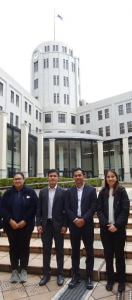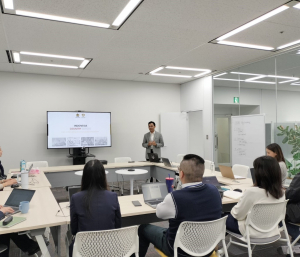Strengthening analytical capacities in the Asia/Pacific region: a participant in the latest WCO initiative shares his insights
23 June 2025
By Diva Tri Prasetya, Senior Intelligence Analyst, Directorate of Narcotics Interdiction, Directorate General of Customs and Excise, IndonesiaThe WCO Asia-Pacific Regional Data/Intelligence Professionals Programme is a new initiative led by the WCO Secretariat in close collaboration with the Regional Intelligence Liaison Office for Asia and the Pacific (RILO A/P), thanks to funding provided by Japan Customs. The programme aims at enabling Customs analysts from the A/P region to deepen their knowledge of data analysis tools, resources and techniques and to build a strong network with their peers in the region. In this article, one of the first three participants in the programme shares his experience.
I have been working at Indonesia Directorate General of Customs since 2018, and I currently work at the Directorate of Narcotics Interdiction located at Customs Headquarters. In January 2025, I joined the first edition of the WCO Asia-Pacific Regional Data/Intelligence Professionals Programme. I expected to gain deeper insights into other countries’ risk management operations, RILO A/P activities, and the tools developed by the WCO to strengthen Customs analytical capacities. The programme not only met these expectations, but it also provided me with fresh perspectives on how international cooperation can contribute to combating the circulation of illicit goods, and left me feeling more optimistic and empowered.
Discovering how to leverage the WCO Customs Enforcement Network (CEN)
The programme began with an intensive online training phase, focusing on two WCO applications, namely, the Customs Enforcement Network (CEN) and the Customs Enforcement Network Communication Platform (CENcomm).
CEN is a central global depository of enforcement-related information. Participants learned how it could be used to produce valuable analysis and intelligence. We also became acquainted with data cleaning techniques and with the development of analytical dashboards by using Microsoft Excel and Power BI.
By understanding how CEN operates, we recognized its potential as a valuable source of intelligence that can be adapted to meet the analytical needs of each Customs administration. To generate representative regional trends, it is essential to have sustained commitment from WCO Members to regularly contribute data to the CEN platform.
Indonesia Customs maintains a dedicated national database on narcotics enforcement and, as part of its commitment to enhancing regional intelligence cooperation, it is working to improve the quality and consistency of data entry into the CEN.
Field immersion in Japan: learning through practice and networking

At the end of February, I travelled to Japan to meet the other two participants in the programme and spend four weeks at the RILO A/P office in Tokyo. We learned how the RILO fosters intergovernmental cooperation across the Asia/Pacific region by facilitating cross-border information exchange, issuing intelligence alerts, and coordinating enforcement operations, in addition to regularly disseminating reports and analyses via National Contact Points (NCPs).
We were also familiarized with the use of open-source intelligence (OSINT). By combining OSINT with data visualization techniques, we learned how to produce timely and actionable intelligence for field operations. The value of these insights increases substantially when enhanced with structured data from CEN – demonstrating its potential as an ideal data source for future regional trend monitoring.
We also engaged in meaningful dialogue with officers from the National Intelligence and Targeting Center (NITC) of Japan Customs to better understand the organizational structure and risk management strategies of the Administration. We discussed the situation and enforcement context of our respective countries, and this dialogue helped uncover areas for improvement.
Discussing prevailing illicit goods trends, particularly in narcotics, allowed us to position our own national challenges within the broader regional landscape. This experience enabled us to visualize trafficking flows and identify emerging threats, as well as the value of cooperation.
We were actively involved in various activities conducted by RILO A/P, including the drafting of RILO ALERTs. These exercises enhanced our understanding of the source data, the trend analysis process, and how intelligence products are developed and disseminated across the region. The hands-on experience also shaped our understanding of how such alerts should be utilized in the field.
We also visited the Japan Regional Customs Office in Kobe, which oversees 31 branch offices and 7,100 km of coastline with approximately 1,000 personnel. Active discussions with Kobe Customs officials, as well as field visits, gave us an immersive view of import surveillance operations.
 Engagement with frontline officers provided a full picture of the business processes and enforcement patterns used at the port. Particularly striking was Japan’s emphasis on Intellectual Property Rights (IPR) enforcement. Japan Customs stands as a regional pioneer in this domain and its IPR framework could serve as a model for many countries, including participants in this programme.
Engagement with frontline officers provided a full picture of the business processes and enforcement patterns used at the port. Particularly striking was Japan’s emphasis on Intellectual Property Rights (IPR) enforcement. Japan Customs stands as a regional pioneer in this domain and its IPR framework could serve as a model for many countries, including participants in this programme.
Finally, we attended the meeting of the Attachés in charge of Customs work at the foreign embassies in Tokyo. It enabled us to greatly expand our professional networks, and opened possibilities for future collaboration and exchange of expertise.
Impact and way forward
Upon returning to our respective administrations, we were encouraged to apply the knowledge and tools acquired during the programme. I delivered a presentation to our management team and to some of my colleagues to share key takeaways from the programme. This was followed by discussions on how the insights gained could be translated into actionable strategies to improve intelligence processes and enforcement efforts. One practical application was the use of Google Alerts to find open-source data. We also explored ways to maximize the analytical use of CEN data within our national framework.
Participating in the programme was insightful. I realized the critical importance of strategic communication and trust when cooperating at the international level. Before the programme, I primarily viewed Customs intelligence through a national lens, centred on operational efficiency and enforcement outcomes. By engaging with colleagues from other countries, I came to appreciate the broader value of sharing data and information, even partial or anecdotal. It reinforced my belief that transparency and timely collaboration, even on small-scale data, can have a significant impact. This shift in perspective will continue to inform my approach to both domestic coordination and cross-border cooperation.
More information
Contact the author

